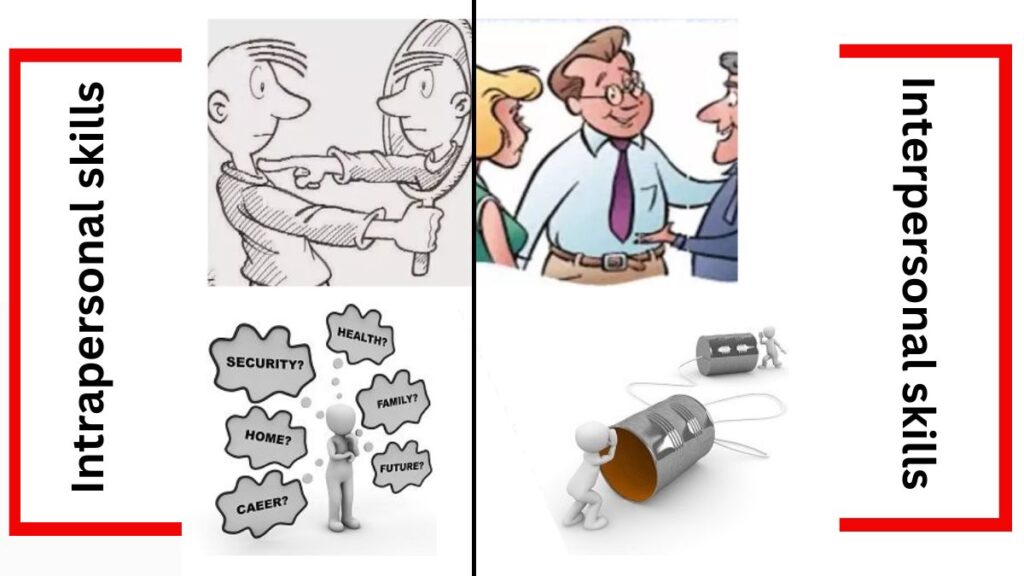
Intrapersonal Skills: The Key to Personal Growth and Success
While the term “interpersonal skill” is familiar to most, the concept of intrapersonal skills remains relatively unknown. However, developing these skills can be just as vital, as they have a profound impact on various aspects of our daily lives.
Defining Intrapersonal Skills
Intrapersonal skill revolves around self-awareness, acknowledging our strengths and weaknesses. These skills encompass the internal communication that takes place within oneself.
Intrapersonal skill empowers individuals to manage their emotions and overcome challenges encountered throughout life. Comparable to emotional intelligence, intrapersonal skill encompass:
- Self-confidence
- Persistence
- Openness to change and new ideas
- Ability to overcome distractions
- Effective time management
- Resilience
- Self-discipline
Distinguishing Intrapersonal and Interpersonal Skill

Interpersonal skills, widely recognized, involve communication between two or more people. In contrast, intrapersonal skills refer to self-communication occurring within one’s mind. Interpersonal skills encompass both verbal and non-verbal exchanges of ideas, often alleviating stress. However, intrapersonal communication can sometimes contribute to stress. Read the difference further in detail =>>Here.
The Importance of Intrapersonal Skill
Developing strong intrapersonal skill allows individuals to maximize their potential across various domains. Understanding our strengths and weaknesses enables peak performance in both personal and professional realms. Effective intrapersonal skills facilitate the building and nurturing of relationships, as they empower us to manage emotions, overcome challenges, and learn from experiences.
Furthermore, these skills help individuals focus on setting and achieving goals. By establishing clear objectives, individuals gain direction and purpose, enhancing their overall productivity. Conversely, those who fail to set goals often lack a sense of purpose and struggle to accomplish as much as goal-oriented individuals.
You may also like to read Best funny debate ideas of All time
Improving Your Intra-personal Skills
For individuals seeking to sharpen their personal skills, several activities can prove beneficial:
- Start a journal: Regularly journaling allows for tracking emotions, goals, and daily experiences, providing a record of personal growth.
- Practice self-kindness: Rather than engaging in self-criticism, strive to acknowledge and celebrate successes, strengths, and achievements. Berating oneself for shortcomings rarely leads to positive outcomes.
- Set goals: Establishing short and long-term goals provides a sense of purpose. Begin with small, attainable goals, gradually expanding to more ambitious objectives. Persevere even if initial attempts fall short, as this fosters self-discipline and resilience. Consider utilizing goal-setting apps like AltiusLife for progress tracking.
- Develop healthy habits: Building a habit is often a prerequisite for achieving goals. Consistent, incremental actions pave the way for goal attainment. Dedicate approximately 60 days to establish a habit, focusing on one at a time before moving on to the next.
- Enhance time management skills: Effective time management is crucial for achieving goals and cultivating healthy habits. Identify and mitigate distractions, prioritize tasks, schedule activities, work in focused intervals, and organize work and living spaces. Learn to say no to avoid over-commitment, allowing time for what truly matters. Capitalize on your most productive periods to tackle important tasks.
Intra-personal Skills in the Workplace
Employees possessing strong intrapersonal skills tend to outperform their peers who lack them. These individuals better navigate stressful situations, manage time efficiently, and exude confidence in their abilities. When employers support employees in developing their intrapersonal skills, it creates a mutually beneficial work environment.
Recognizing the significance of intrapersonal skills and investing effort in their cultivation can profoundly impact personal growth, job performance, and overall well-being.
What Are the Top Interpersonal Skills Needed Today?

Be a Good Communicator:
Develop effective verbal and written communication skills for professional interactions.
Active Listening:
Pay attention, ask questions, and show understanding to engage in meaningful conversations.
Show Empathy:
Understand and acknowledge others’ thoughts and feelings to foster positive relationships.
Conflict Management:
Resolve conflicts calmly and professionally, addressing issues and implementing solutions.
Teamwork:
Collaborate with others, fulfill responsibilities, and contribute to the success of the team.
Be Coachable:
Be open to learning, accept constructive feedback, and continuously improve your skills.
Your Attitude Counts:
Maintain a positive and professional attitude, as it impacts relationships and opportunities.
Leadership Skills:
Demonstrate qualities like decision-making, strategic thinking, and motivating others to lead effectively.
Negotiation:
Use effective communication and compromise to reach agreements that benefit all parties involved.
Be Able to Influence Others:
Gain trust and respect to positively impact decisions and garner support from peers and superiors.
FAQs
What are some examples of intrapersonal skills?
Key intrapersonal skills include self-confidence, persistence, openness to change, overcoming distractions, time management, resilience, and self-discipline.
How can I develop my intrapersonal skills?
There are several activities that can help improve intrapersonal skills, such as journaling for self-reflection, practicing self-kindness and positive self-talk, setting goals, cultivating healthy habits, improving time management, and leveraging personal strengths.
How do intrapersonal skills benefit the workplace?
Strong intrapersonal skills in the workplace contribute to better performance, effective stress management, confidence in one’s abilities, and a positive work environment. Employees with these skills tend to be more productive and capable of handling challenges.
Can intrapersonal skills be learned and improved?
Yes, such skills can be learned and improved with practice and conscious effort. By engaging in self-reflection, setting goals, and utilizing strategies for self-management, individuals can enhance their intrapersonal skills over time.
How can employers support the development of intrapersonal skills in the workplace?
Employers can support the development of such skills by providing resources for personal growth, offering training programs on self-awareness and emotional intelligence, fostering a positive work environment, and recognizing and rewarding employees’ efforts in enhancing their intrapersonal skills.
What are the benefits of investing in the development of intrapersonal skills?
Investing in the development of these skills can lead to personal growth, improved relationships, enhanced goal achievement, effective stress management, increased confidence, better performance in various areas of life, and overall well-being.



